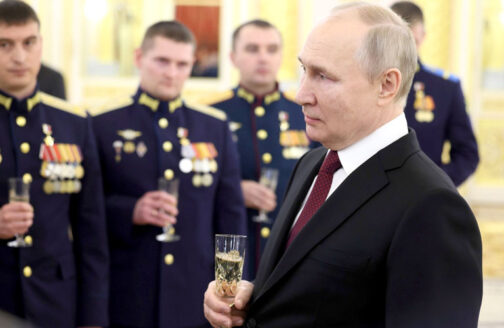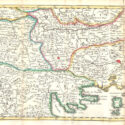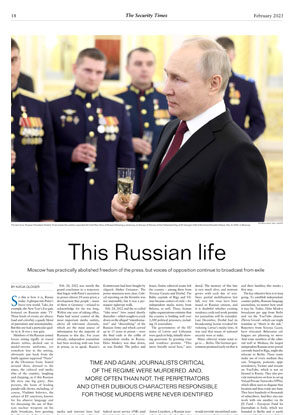This Russian life
 The last of us: Russian President Vladimir Putin toasts the soldiers awarded the Gold Star Hero of Russia following a ceremony on the eve of Heroes of the Fatherland Day at St George's Hall of the Grand Kremlin Palace, Dec. 8, 2022, in Moscow.
The last of us: Russian President Vladimir Putin toasts the soldiers awarded the Gold Star Hero of Russia following a ceremony on the eve of Heroes of the Fatherland Day at St George's Hall of the Grand Kremlin Palace, Dec. 8, 2022, in Moscow. Moscow has practically abolished freedom of the press, but voices of opposition continue to broadcast from exile
So this is how it is, Russia today. A glimpse into Putin’s brave new world. Take, for example, the New Year’s Eve gala featured on Russian state TV. These kinds of events are always loud and colorful, a gaudy blend of patriotism and sentimentality. But this one had a particular quality to it. It was a war gala.
Members of the Russian armed forces sitting rigidly at round dinner tables, decked out in medal-strewn uniforms, yet somehow lost in the setting, obviously just back from the battle against supposed “Nazis” at the Ukrainian front. Seated around them, dressed to the nines, the cultural and media elite of the country, laughing and clapping, as if this Russian life were one big party. Also present, the hosts of leading pundit talk shows, including, of course, Vladimir Soloviev, the subject of EU sanctions, known for his abusive language and for discussing the use of Russian nuclear weapons on his daily broadcast, here greeting the “heroes” of the victorious Russian army.
On the New Year’s Eve stage, they danced to a Ukrainian folk song and recited a poem about the impending bitter cold and hunger in the west, a fate now also befalling those stupid Germans, it was noted, who no longer want to buy gas from bighearted Russia.
It went on like this for hours, just a tiny slice of Putin’s world, in which even the monstrosity of his war became a garish spectacle beneath a shower of confetti. And yet one also sees just how effective this propaganda actually is – a propaganda based on collective fantasies of the alleged grandeur of an empire, ostensible Orthodox exceptionality, simultaneous narratives of victory and victimhood, would-be enemies and the soul-crushing poison of perpetual lies.
Is there anyone left who can push back against this?
Feb. 24, 2022 was merely the grand conclusion to a trajectory that began with Putin’s ascension to power almost 24 years prior; a development that people – many of them in Germany – refused to acknowledge for far too long. Within one year of taking office, Putin had seized control of the most important media outlets, above all television channels, which are the main source of information for the majority of Russians to this day. For years already, independent journalists had been working with one foot in prison, so to speak. Russia’s media and internet laws had become increasingly arbitrary. Reporters and editorial offices operated under the threat of being labeled “foreign agents” – a charge akin to treason – hanging over their heads like the sword of Damocles.
Time and again, journalists critical of the regime were murdered. And, more often than not, the perpetrators and other dubious characters responsible for those murders were never identified.
Editorial teams carried out their work under tremendous pressure: Novaya Gazeta, arguably Russia’s most famous independent newspaper and a symbol of Perestroika, that breathlessly short interlude of freedom; and the small, vibrant and critical internet TV channel Dozhd, otherwise known as TV Rain. The radio station Ekho Moskvy had indeed found itself owned by Gazprom-Media. And the daily business newspaper Kommersant had been bought by oligarch Alisher Usmanov. The power structures were clear. Critical reporting on the Kremlin was not impossible, but it was a permanent tightrope walk.
Feb. 24, 2022 and the so-called “fake news” laws issued shortly thereafter – which sought to crack down on the alleged “misinformation” and “discrediting” of the Russian Army and which carried up to 15 years in prison – were the final nails in the coffin of independent media in Russia. Ekho Moskvy was shut down, as was Dozhd. The police and federal secret service (FSB) paid “visits” to local journalists critical of the regime; these threats, searches and arrests were clear and conducted in plain sight. The prominence of Dmitry Muratov, the Nobel Peace Prize laureate and longtime editor-in-chief of Novaya Gazeta, was of no help at all. The paper had its printing license taken away.
The verdict against Ivan Safronov was a watershed moment: last September, the former Kommersant journalist and expert in defense industry issues, was formerly charged with “high treason” and sentenced to 22 years in a labor camp. It was also a warning sign for the few remaining independent journalists left in the country. From that moment on, they would be forced to carry out their work de facto underground.
Hundreds went into exile, sometimes having to make that decision within a matter of hours. Entire editorial teams left the country – among them from Novaya Gazeta and Dozhd. The Baltic capitals of Riga and Vilnius became centers of exile – for independent media teams from Belarus, as well. There, human rights organizations estimate that the country is holding well over 1,300 political prisoners, including 31 journalists.
The governments of the EU states of Latvia and Lithuania were quick to help, initially showing generosity by granting visas and residence permits. “This move literally saved lives,” says Anton Lysenkov, a Russian journalist who has lived in Riga for several years.
Today, however, this practice has become increasingly controversial. The people of the Baltic states suffered for decades under Soviet occupation, with tens of thousands being deported, murdered. The memory of this fate is very much alive, and mistrust grows with each day of war. Since partial mobilization last fall, very few visas have been issued to Russian citizens, and it is doubtful whether existing residence cards and work permits for journalists will be extended. Last December, Dozhd had its broadcasting license revoked for violating Latvia’s media laws. It was said that issues of national security were at stake.
Many editorial teams want to go to … Berlin. The German government promised early on that it would provide streamlined assistance to imperiled journalists and human rights activists. For example, Foreign Minister Annalena Baerbock promised: “You can come to Germany, there will be no bureaucratic hurdles.” Claudia Roth, Germany’s State Minister for Culture and the Media, also sought to give these “skilled democracy workers” long-term prospects. A bold idea. Berlin – which had already functioned as a center of Russian exile after the 1917 Revolution – becoming the European capital of independent Russian media.
As is so often the case, however, a closer look at real-life outcomes revealed a large gap between intended impact and implementation: competing areas of administrative responsibility, security issues, the German bureaucratic labyrinth. By late 2022, humanitarian visas had been granted to roughly 100 Russian journalists and their families; this marks a first step.
The key objective here is to keep going. To establish independent, counter-public, Russian-language journalism, no matter how small it may be. Today, Ekho Moskvy broadcasts per app from Berlin and via the YouTube channel Zhivoy Gvozd – which one might translate as “thorn in the side.” Reporters from Novaya Gazeta have relocated. Belarusian colleagues are planning to move. And some members of the editorial staff at Meduza, the largest independent Russian news portal, currently based in Riga, might also relocate to Berlin. These teams make use of every medium they can: Telegram, podcasts, apps, newsletters, Twitter and streams on YouTube, which is not yet banned in Russia. They also provide instructions on how to set up Virtual Private Networks (VPNs), which allow users to disguise their location and thus evade any bans. They have hundreds of thousands of subscribers. And they also network with one another via the JX Fund – European Fund for Journalism in Exile, which was founded in Berlin and is partly supported by Germany’s federal government. The fund also helps to develop viable business plans for media in exile.
It comes, of course, with a sad notion: that models designed to foster journalism in exile could be “scaled” – for journalists fleeing from other countries. From Afghanistan, for example, or Iran.
Many Russian journalists feel guilty. They feel partly responsible for this war. All the more reason for them to see working in exile as an opportunity. They are aware of the risks. So be it. They continue to broadcast news about the war, covering the crimes taking place, calling out the perpetrators by name on all channels. Indeed, the excuse – so well known and used in Germany for many years – that no one could have known about “it,” will not be credible in Putin’s new Russian world.
Katja Gloger is a journalist and author of, among other books, Putins Welt (Putin’s world). She has been writing about Russia for more than 30 years and has lived in Moscow and Washington. She holds the honorary position of Executive Board Member at RSF Reporters Without Borders Germany. RSF is one of the founding organizations of the JX Fund – European Fund for Journalism in Exile.




